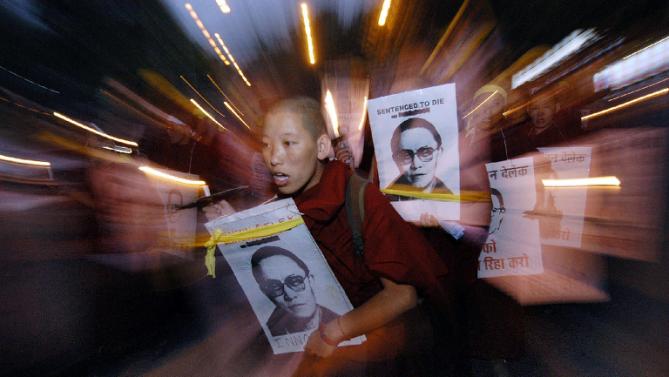
(TibetanReview.net, Jul21, 2015) – Calling him a separatist leader, China has expressed scorn over Tibetan protests and international outcries over the Jul 12 death in highly questionable circumstances of the 65-year-old prominent Tibetan monk political prisoner Tenzin Delek Rinpoche. After refusing to explain the cause of the death or to provide a death certificate despite repeated pleas by his relatives, China’s official Xinhua news agency had reported Jul 19 that the activist religious leader had died of a sudden cardiac arrest.
Contending that the death of the monk who had worked “to “develop social, medical, educational and religious institutions for Tibetan people, as well as to protect the environment” was not worthy of lament, a Xinhua commentary Jul 19 reiterated the false bombing charges which had led to his eventual life-sentence on Jan 23, 2003.
It accused him of having incited his assistant Lobsang Dhondup to stage five bombings in Sichuan province between 2000 and 2003, which it said killed one person and injured 11 others. The trial was held in secret and Lobsang Dhondup executed almost immediately. China claimed the two had confessed, but not a shred of evidence was presented to substantiate the allegations. Tenzin Delek Rinpoche was also sentenced to death, but with a two-year reprieve.
The commentary claimed that Tenzin Delek Rinpoche was in poor health and was diagnosed with high blood pressure, coronary heart disease and other illnesses at the time of his imprisonment. It said Chinese law barred medical parole for life convicts. However, it failed to explain why his body was not released to his family for a traditional burial despite pleas from his relatives and monastery but cremated by prison officials with undue haste in the jail where he had died.
The commentary took note of the fact that Tenzin Delek had been recognized as “a living Buddha” by the Dalai Lama in 1986 and accused him of having “instigated several separatist movements in China” thereafter. It added that he was convicted of the alleged bombings and splitting the state. Tibetans say Chinese leaders falsely implicated him in the unsolved bombing campaign as his activism and immense popularity and stature were an eyesore to them.


